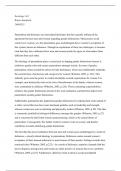Sociology 144
Robyn Stainforth
26989255
Paternalism and deference are interrelated ideologies that have greatly influenced the
agreement between men and women regarding gender distinctions. Men possess social
control over women, yet, this paternalism goes unchallenged due to women’s acceptance of
this system, known as deference. Through an exploration of these two ideologies, it becomes
clear that they have influenced how men and women positively agree on what makes them
different from each other.
The ideology of paternalism plays a crucial part in shaping gender distinctions because it
reinforces gender roles and creates expectations amongst society. In terms of gender,
paternalism centres around the notion of male dominance, where men traditionally undertake
the societal roles of protectors and caregivers for women (Wharton, 2005, p. 223). This
authority gives men the power to control and define societal expectations for women. For
example, men historically took on the role of breadwinners in the family, whereas women
were constrained to childcare (Wharton, 2005, p.226). These contrasting responsibilities
reinforce the gender distinctions present in the work institution, and therefore depicts how
paternalism moulds gender distinctions.
Additionally, paternalism has legitimised gender distinctions by making them seem natural. It
is often viewed that men have more dominant qualities such as leadership and strength,
whereas women are seen as nurturing and physically weaker (Wharton, 2005, p.50). This idea
is commonly justified by biological differences amongst the genders (Wharton, 2005, p.27)
and it concretes the belief that women need protecting, which is the central theme of
paternalism. Consequently, this further restricts women’s roles in society, and thereby
contributes towards solidifying gender distinctions.
The fact that this power imbalance between men and women goes unchallenged is a result of
deference, a closely related ideology to paternalism. Deference centres around women’s
acceptance of their deemed inferiority to men because of their positive feelings towards their
restricted roles (Wharton, 2005, p.223). As a result of deference, majority of people find the
power disparity amongst men and women as either positive or neutral, but never a problem
(Wharton, 2005, p.223). Furthermore, deference leads women to accept and uphold




